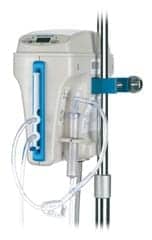By Dustin Telford, CHTM, CBET, CRES, CLES
As guardians of the healthcare technology management (HTM) industry, our essential role in ensuring patient safety and well-being cannot be overstated. Biomedical equipment technicians (BMETs), field engineers, depot-level service providers, and remote support teams are responsible for maintaining, repairing, and managing devices that are indispensable to patient care. To underscore the importance of our profession and establish a uniform standard of excellence, we must champion the cause of professional licensing for all roles involved in servicing medical equipment across every U.S. state.
Licensing is an established norm in many healthcare, engineering, and electrical fields. Licenses serve as a testament to the qualifications, knowledge, and expertise of professionals like physicians, nurses, electricians, and engineers. These licenses ensure they are equipped to perform their duties safely and effectively. For example, licensed electricians are trusted to work on complex electrical systems, where errors could lead to serious safety risks. Similarly, in healthcare, a licensed nurse or doctor is a patient’s first line of defense, making their qualifications crucial for patient safety.
Introducing licensing for BMETs, field engineers, and those involved in depot-level and remote service roles would bring several advantages. To start, licensing would ensure that only qualified individuals are entrusted with the responsibility of working on critical medical equipment, reinforcing patient safety. It would also standardize the skills and knowledge within the industry, making it easier for employers to evaluate potential employees. Furthermore, licensing would elevate our profession, inspiring increased recognition and respect from our peers in healthcare.
However, potential challenges must be acknowledged. Licensing could introduce a financial burden, which might deter individuals from joining or continuing in the profession. There is also the risk of increased bureaucracy, leading to potential delays and complexities in the licensing process.
Despite these potential obstacles, the advantages of licensing clearly outweigh the drawbacks. To support this cause, we encourage you to engage with your state representatives and professional associations. Inform them about the critical importance of licensing for BMETs and related roles—and request their support in advocating for licensing legislation. Networking with other HTM professionals is also essential. By exchanging ideas and experiences, we can foster a collaborative effort to promote the cause within the HTM community. Staying informed about the latest developments in licensing and regulations, both in your state and across the country, is equally important.
Our profession’s focus on servicing equipment intended for others’ use fits seamlessly into the broader Right-to-Repair movement. This movement advocates for consumers and third-party technicians to have the freedom to repair and maintain devices without being solely reliant on manufacturers. By advocating for licensing, we endorse the rights of qualified professionals to repair medical equipment while maintaining an unwavering commitment to patient safety.
Many states already mandate licensing or registration for engineers working on specialized equipment, such as X-ray, CT, and linear accelerators. This signifies the value placed on having qualified professionals maintain and repair these critical devices. By extending licensing requirements to encompass BMETs and related roles, we can elevate patient safety and raise the stature of our entire profession.
As HTM professionals, our responsibility extends beyond our daily tasks. We are accountable for fostering the highest standards in our field. By advocating for licensing for all who service medical equipment, we can champion patient safety, elevate our profession, and reinforce the right-to-repair movement. It’s crucial that we unite to promote licensing in every state, ensuring that the servicing of medical equipment is conducted by skilled and qualified professionals.
This collaborative effort will not only benefit the HTM community but also contribute to the overall safety and well-being of patients who rely on the medical equipment we maintain and repair. The time is now for us to come together and champion this cause, creating a future where our profession is recognized and respected for its indispensable role in the healthcare ecosystem.
If you are interested in discussing and supporting a collaborative effort to advocate for licensing, please feel free to connect with me. I am Dustin Telford, CHTM, CBET, CRES, CLES, and I am deeply committed to this cause. You can find me on LinkedIn here. Together, we can work towards a future where our profession is valued, respected, and held to the highest standards.
By pursuing this collective effort, we can strengthen our industry and further the overall quality of healthcare. A future where licensing is a standard requirement for all roles in servicing medical equipment will result in a safer environment for patients, healthcare professionals, and the HTM community alike. Let’s take the necessary steps today to ensure a brighter tomorrow for everyone involved in HTM.
In summation, advocating for licensing in our profession is an essential step toward ensuring patient safety and elevating the stature of the entire HTM community. By working together and engaging with key stakeholders, we can make a difference and set the stage for a more professional, skilled, and respected industry. So, let’s join forces and make a lasting, positive impact on the future of healthcare technology management. The time is now to make our voices heard and work toward a better tomorrow for all.
Dustin Telford, CHTM, CBET, CRES, CLES, is a regional biomedical equipment technician at Bio-Electronics. Questions and comments can be directed to 24×7 chief editor Keri Forsythe-Stephens at [email protected].






I thought this was what the certification process was for. By saying that the government needs to be involved in the system, creating un-needed bureaucracy and additional burdens on an already stretched-thin workforce negates the value of certification.
The differences in the State to State licensing requirements would prevent or discourage people from relocating for a better opportunity, stifling the free market supply and demand in our labor pool. The suggestion of licensing is more regulatory gatekeeping and not conducive to growing the career field as we need to.
Excellent Article Dustin.!! Thank you for raising this topic. Licensure, globally remains the differentiating designation between using the connotation of “Professional” or not. No differently than recognizing a Doctor, Pilot, Engineer, certain Nursing levels, Maritime Captains, or others. “Biomedical, Clinical, or Medical” Engineers (whichever title one chooses), are professionals, just not viewed that way in a Global sense. We haven’t pushed or forced that “Stake in the Sand”. Hopefully, someday, we will push ourselves past that hurtle. Nice Job – Thank You.!!
Where are the case studies to prove the need? Patient safety is of course the objective of the industry but the only results I see coming from licensing here is pride in personal accomplishments, the recognition thereof, higher income for the licensee and a greater expense to the tax payer and end user. More regulation is rarely a good thing and generally serves to reduce the freedom of enterprise and always increases the expense for a particular outcome. If you wish to make the case for licensing then bring examples and incidences where the lack of licensing produced an adverse outcome. I’ve been in the industry 45 years. The few incidences where lack of proper certification or licensing resulting in compromised patient safety IMHO do not justify the cost. Our industry is already suffering from the loss of experienced biomedical technicians. This will only exacerbate our inability to keep up with the work load.
No Thank You.
I thought this was what the certification process was for. By saying that the government needs to be involved in the system, creating un-needed bureaucracy and additional burdens on an already stretched-thin workforce negates the value of certification.
The differences in the State to State licensing requirements would prevent or discourage people from relocating for a better opportunity, stifling the free market supply and demand in our labor pool. The suggestion of licensing is more regulatory gatekeeping and not conducive to growing the career field as we need to.